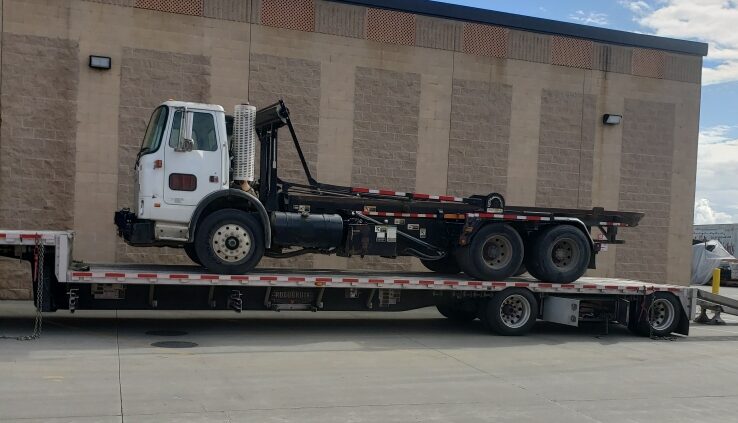Everything You Need to Know About Roll Off Trailer Transport
If you’re looking for alternative equipment to replace your or complement your dumper truck, then you might want to invest in a roll-off trailer transport. It offers higher versatility than its hydraulic-powered counterparts as they feature a flatbed or bin attachment. Whether you’d like it to serve more than one project or a multiple bin package to provide trash collection services, you’ll enjoy a low-cost investment with significant ROIs.
A roll-off trailer is a trailer designed to carry wheeled open-top containers that are usually rolled off the trailer along tracks fitted on the trailer chassis. They are ideal equipment for use in various applications, such as garbage and trash collection. You can use them to move a wide range of cargo, including excavated soil, gravel, or construction aggregate. Roll-off trailers have enhanced aesthetics and will look clean and professional when deployed on a job site or to serve neighborhoods.
If you’d want further insights into why the roll-off trailer is a popular choice among many discerning load movers, stick around. This article discusses the types of roll-off trailers available in consumer markets, how to choose the right trailer for transport, and critical roll-trailer safety tips.

Electric-Powered vs. Engine-Driven Roll-Off Trailers
There are two major types of roll-off trailers: electric- and engine-powered trailers. They differ in three aspects, and it is critical to know them to choose the best option for your needs. First, electrically-powered roll-off trailers are pricier than their engine-driven counterparts. On the other hand, motor-dependent trailers are more powerful than electrically-driven roll-off trailers.
Electric roll-off trailers are designed to use 12V hydraulic cylinders and a drum system. They depend on power from the tow cab, or you can use the battery, although you might have to charge it daily or weekly, based on the use frequency. Unlike engine-driven roll off trailers, electrically-powered roll-offs are used to move light and medium loads.
Engine-driven roll-off trailers feature a motor-powered hydraulic and winch system. They don’t rely on power from the tow cab. To charge the engine, you need to operate the vehicle for long hours. For instance, a 5-minute drive is not enough to fully charge the battery. Instead, ensure that the engine makes at least 15-minute intermittent runs to get the battery fully charged.
Match the Right Roll-Off Trailer with Your Load-Moving Project
Choosing the most suitable roll-off trailer to transport loads is straightforward, considering the nature of the material and volume that needs moving. You can choose standard, heavy-duty, or ultra-heavy-duty roll-off trailers. When you need to carry light loads, such as household items or a walk-in roll-off that can be manually loaded, it would be best to acquire a standard roll-off trailer.
If you are working on a construction site and want to move loose excavated soil, wood, light debris, or demolition trash, you need a heavy-duty roll-off dump trailer for the job. Roll-off dump trailers are great for loose materials versus oversize construction equipment transport, offering versatility for projects. That makes heavy-duty roll-off trailers an excellent choice for construction works and infrastructural development projects.
When you want to move even heavier loads like concrete blocks, brick, or dirt, you need a dump trailer that can handle the immense load weight of such materials. Loose soil, for instance, weighs about 1.4 tons per yard, whereas concrete weighs approximately 1 ton per yard. Heavy cargo requires a roll-off trailer with a larger payload capacity, and ultra-heavy-duty options are the best-suited for such loads.
Essential Tips for Roll-Off Trailer Safety
Whether you own an electric-driven or an engine-powered roll-off trailer, it is crucial to observe the standard safety procedures to prevent injuries and tragedies while moving loads.
Proper Equipment Maintenance
Before towing any load, ensure that the trailer is in good working conditions. That means adhering to routine maintenance schedules. That includes the following:
– Greasing the trailer-track bearings to alleviate friction and corrosion
– Ensuring the wheel lug nuts are tightened to the correct torque
– Check tire pressure and inspecting the tire treads to ensure they are of good depth
– Hiring a qualified technician to inspect the brakes, emergency break-away switch, and the electronic brake controller
As you adhere to routine trailer maintenance, you also need to maintain the tow cab properly. Remember, towing exerts extra pressure on the towing vehicle, and it would help if you took the car to a professional auto repair center for servicing after every project.
Ensure Proper Weight Distribution: Ensure that your load’s weight is evenly distributed on the trailer bed. Having a balanced weight reduces wear and tear of the tow cab and trailer. On the same note, don’t overload the trailer beyond its maximum payload rating, as it might cause the trailer to flip and crash when you speed.
Attach the Trailer to the Tow Cab Correctly: Always ensure that the roll-off trailer is correctly set on the tow ball and firmly hitched to the trailer latch. It would help if you also had a safety chain crisscrossed between at the point of attachment to tightly coupled the trailer and the tow vehicle. Ensure the ball mount turns easily for hassle-free cornering and maneuverability.
Transport Your Equipment With A Roll Off Trailer Today!
Step 1: Fill Out Quote Form
Fill out the short & easy quote form.
Step 2: Speak With An Agent
We’ll pick up your heavy equipment or vehicle.
Step 3: Get Transported On Time
We deliver on time so you can get back to work.